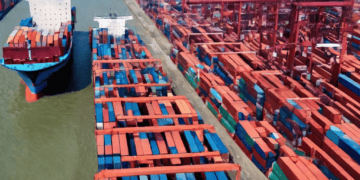The recent surge in ocean shipping rates, anticipated to persist through 2022, has substantially boosted the profits of worldwide cargo carriers, with significant ramifications for businesses and consumers across various regions.
Throughout 2021, the spot rate for a 40-foot container from Asia to the U.S. soared to unprecedented levels, reaching over $20,000, a stark contrast from its previous rates below $2,000. Presently, these rates hover around $14,000. Long-term contractual rates between carriers and shippers have risen approximately 200%, indicating prolonged elevated prices.
Major corporations such as Walmart and Ikea possess the leverage to negotiate better terms or absorb these increased expenses. However, smaller importers and exporters, particularly those in economically challenged countries, lack such flexibility. This situation has underscored the dominance of shipping lines in the market and their exemption from antitrust laws.
Amruth Raj, managing director of Green Gardens, a vegetable processor in rural India, highlighted the adverse impact on small and medium-sized enterprises. Raj cited a significant capital reduction due to European buyers balking at heightened costs, stating, “They exploit our desperation.”
In regions like Africa, concerns have been raised regarding potential inflation and food security risks. Achil Yamen of the Cameroon National Shippers’ Council emphasized these worries during a United Nations trade body conference call.
Contrarily, despite the supply chain turmoil, the shipping industry has witnessed a historic pinnacle in its profitability post-pandemic. Ocean-freight carriers collectively amassed an estimated $150 billion in profits in 2021, marking a substantial increase from previous years of financial struggles.
Shipping giants like Denmark’s A.P. Moller-Maersk A/S and Hamburg-based Hapag-Lloyd AG have experienced remarkable financial success, raising concerns among economists about inflationary pressures stemming from persistently high transportation prices.
Economists have pointed out that the surge in shipping costs is contributing to longer-term inflationary effects, with estimates suggesting a 15% increase in shipping costs resulting in a 0.10 percentage point rise in core inflation after one year.
Efforts to address these concerns have led to calls for regulatory intervention in the container-shipping market. The concentration of market control within a handful of shipping lines, operating under alliances, has drawn scrutiny. Despite governmental discussions and investigations into potential anti-competitive behavior, regulatory bodies face limitations in challenging such practices due to existing shipping laws and antitrust exemptions.
While carriers justify the escalated prices as a consequence of pandemic-induced disruptions in supply and demand, critics argue that the situation highlights asymmetrical pricing power favoring shipping alliances. Importers and exporters globally have faced challenges, including rejected shipments and significantly increased freight rates, impacting their businesses adversely.
As governments and regulatory bodies grapple with these challenges, the repercussions of the ongoing supply chain crisis on businesses and consumers worldwide remain a focal point of concern.
As stakeholders and regulatory bodies navigate the complexities of the ongoing supply chain crisis, the spotlight remains on the intricacies of the shipping industry and the need for potential reforms.
The pandemic-induced surge in demand, coupled with limited capacity and port congestion, has led to a notable imbalance in global trade logistics. Major ports in the United States encountered substantial delays in processing imports, exacerbating the strain on supply chains. This newfound prominence of the shipping industry, previously overlooked by the general public, has prompted increased scrutiny and calls for regulatory intervention.
Despite governmental inquiries into potential anti-competitive behavior, findings as of now have not provided substantial evidence to warrant regulatory actions. In response to mounting concerns, the White House has urged the Federal Maritime Commission (FMC) to leverage its authority to ensure fair competition within the shipping market. However, existing regulations and the industry’s exemption from antitrust laws have limited the scope for immediate interventions.
Efforts to address the challenges posed by the shipping crisis have prompted proposals for regulatory reforms. The U.S. House of Representatives passed a bipartisan bill aimed at empowering the FMC with greater oversight authority, prohibiting discrimination against American cargo, and providing avenues for businesses to contest carrier fees. Nonetheless, these proposed reforms do not directly target the antitrust immunity granted to shipping companies.
Similarly, in Europe, the exemption of shipping companies from anti-competitive regulations is set to undergo review in 2024. The European Commission is closely monitoring the situation, acknowledging the significant price increases in the container shipping industry.
Amidst the ongoing debate on the causes and consequences of the supply chain disruptions, the plight of smaller importers and exporters remains a significant concern. Instances of rejected shipments and exorbitant freight rates have presented substantial challenges, particularly for businesses reliant on smooth and cost-effective trade operations.
In Sri Lanka’s apparel manufacturing sector, exporters struggle to fulfill orders due to shifts in vessel allocations favoring more lucrative routes. Such instances have sparked concerns about the fairness and sustainability of the current shipping pricing structures.
The global shipping industry finds itself at a critical juncture, with stakeholders urging for a reevaluation of regulatory frameworks and greater transparency within the market. As governments and regulatory bodies deliberate on potential solutions, the need for a balanced approach that addresses the concerns of businesses, consumers, and the wider global economy remains paramount. Future actions will require a delicate balance between promoting fair competition and ensuring the smooth functioning of global trade networks.
Stay on top of supply chain logistics news updates at The Supply Chain Report. Visit ADAMftd.com for free international trade tools.
#GlobalShippingCrisis #OceanFreightRates #SupplyChainDisruption #ShippingIndustryNews #InflationImpact #FreightCostSurge #LogisticsChallenges #TradeEconomy #ContainerShippingMarket #AntitrustExemptions #ShippingProfitability #RegulatoryReforms #ImportExportChallenges
















